As climate change outcomes are becoming increasingly visible, governments worldwide are joining efforts to reduce CO2 emissions. That, of course, creates a favourable environment for the new environmentally focused initiatives. The renewable energy startups sector is one of the most rapidly growing ones in this respect, so we decided to take a closer look at it in our series.
Along with the regulations getting increasingly strict in various regions, particularly in the EU, renewable-oriented initiatives are becoming not only more welcome but necessary. The Fit for 55 package puts new responsibilities on the EU companies across sectors, obliging them to report their direct and indirect emissions (from the whole supply chain). Renewable businesses bring them closer to that goal and help them access financing and certificates.
At the same time, they pave the way for the business and individual clients to not only cleaner but also cheaper energy. With renewable solutions, both can become at least partially independent of the energy prices, which have been fluctuating strongly with the recent chain of events (pandemic, war in Ukraine and gas sanctions for Russia, inflation). Clean energy is a necessity from the climate and economic perspective, but at the same time, a moral responsibility. More and more customers are looking for renewable solutions out of environmental consciousness, and the best renewable energy startups are there for it.
With a positive sentiment among venture capital institutions, renewable energy startups are popping up at an impressive pace. We picked the most innovative initiatives to give you a hint of what our more sustainable future may look like!
Founded: 2014
Total funding amount: $2.8M
Industry: solar energy
Applications: solar energy grid platform
Mission: Delivering renewable energy to vulnerable communities
Discussions about renewables in a public discourse usually focus on the environmental and climate aspect. What’s often overlooked is the empowering factor of it. Solar energy can help underprivileged communities access energy despite their economic limitations and geographical isolation. Not only do they gain independence from raising electricity prices, often outside their budget, but from the infrastructure that doesn’t develop in their favour.

A Bangladesh-based renewable energy startup, SOLShare, has noticed solar solutions’ potential in this respect and decided to act on it. They developed an energy trading platform that gives low-income households an opportunity to produce their own energy and sell its excess back into a microgrid network. The idea proved effective in Dhaka, connecting 6 million homes and around 2 million electric rickshaws into a grid that makes energy access more democratic. All it takes is to install a SOLShare electric box that’s linked to the peer-to-peer platform or switch to a provided electric vehicle.
As the testimonials of the local community prove, the solution has already changed the life of numerous people for the better, both in terms of comfort of living and entrepreneurial opportunities. We can’t wait to see this idea being adopted in other parts of the world where energy access is an issue!
#2 KitePower
Founded: 2016
Total funding amount: $3M
Industry: wind energy
Applications: mobile wind energy production
Mission: Reducing material waste and increasing efficiency of the wind energy production
Wind energy production comes in a package with a specific infrastructure that seems irreplaceable at this point. Enormous wind turbines seem a necessary evil that enables us to enjoy clean energy from this source.
Aside from landscape pollution, such infrastructure also affects the natural habitat of various animals, particularly migratory birds, which can collide with the turbines. Although the frequency of such incidents is not high enough to pose a significant threat to the survival of the species, it leaves an imprint on their population. On top of that, the turbines have to be replaced every 20 years on average, and the carbon and glass fibre used for their manufacturing isn’t recyclable. That means a lot of waste, considering their size.
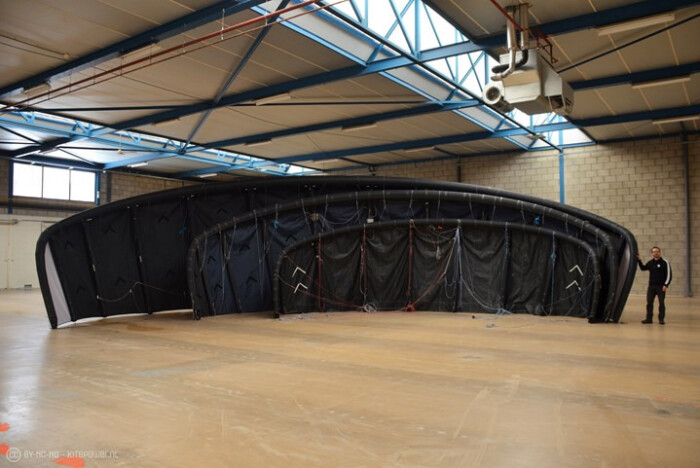
The Dutch startup KitePower came up with a solution to these issues, creating a technology that enables harvesting wind energy with aerodynamic or aerostatic lift devices that look similar to kites. Aside from the waste reduction, which goes as high as 90%, their devices can be even twice as efficient as the turbines. If the Airborne Wind Energy technology, which KitePower relies on, reaches broader adoption, we will likely see the percentage of wind energy in overall power production blow up!
#3 FlexiDAO
Founded: 2017
Total funding amount: $ 7M
Industry: renewable energy
Applications: energy traceability improvement
Mission: helping consumers and producers move to a 24/7 carbon-free power grid through blockchain
Blockchain is a great tool for improving security and making financial services more accessible and democratic, but can it also contribute to the environment? It turns out it can also fuel the growth of the renewable sector, improving energy traceability. How exactly? The data on the blockchain is stored in immutable chains, which, once added, cannot be modified or deleted. Such a model enables individuals and businesses to trace and prove their energy production and usage.
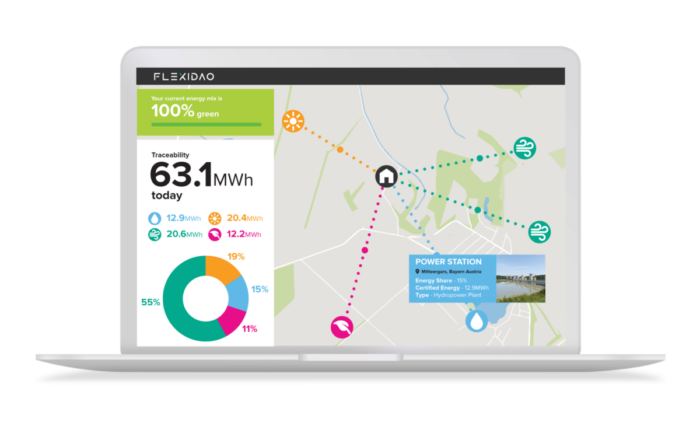
FlexiDAO, a Dutch/Spanish startup, provides them with a tool to do that in a simple and automated manner. With their blockchain-based platform, users can trace energy usage and production in a credible and verifiable way, rewarded for their decarbonization efforts. For individual users, that could be the governmental programs that incentivize CO2 emissions reduction, and for the businesses – the funding and certification that proves their sustainability. Now that the EU law has become even stricter on emissions reporting, such a blockchain system could become essential in proving the credibility of the reports. A long list of investors, including Microsoft Climate Innovation Fund, proves that the solution has a future ahead.
#4 Saule Technologies
Founded: 2014
Total funding amount:
Industry: solar energy
Applications: perovskite energy production
Mission: Increasing the accessibility of solar energy production
Photovoltaics is changing communities worldwide, providing more democratic access to energy, as the first example on our list proves. However, it still requires a particular infrastructure and space to work, whether a piece of land or an architectural element. At the same time, the most popular solutions are not mobile and don’t use the potential of surfaces that serve for sourcing green energy.
The invention of Olga Malinkiewicz, a Polish scientist and a founder of Saule Technologies, tackles this issue, providing users with a new type of solar energy technology – easy to place on any surface and producing much less waste. The company uses perovskites, a group of minerals applicable in photovoltaics, to create its ultra-light, thin, and elastic solar cells. Contrary to the silicon-based ones, they can transform artificial light into energy, which provides its users with even more flexibility.

The technology is easy to apply and cheap, creating competition for traditional solar solutions. Even though it didn’t yet revolutionise the photovoltaics sector due to the fragility of the perovskites, once this obstacle is removed, nothing will stand in its way!
#5 Saiflow
Founded: 2022
Total funding amount: pre-seeding
Industry: cybersecurity/renewable energy
Applications: smart grid protection, risk management
Mission: Reducing smart grids’ vulnerability to cyberattacks
As the popularity of smart grid solutions is increasing worldwide, cybercriminals are gaining another area to aim at. Since the smart grids operate on software and have many points of entry (the devices linked to the network), they are a perfect target. Being a relatively new and rapidly developing type of infrastructure, they still lack dedicated protection that would match their specific needs. Or rather, they lacked until recently, when Saiflow’s solution came into play.
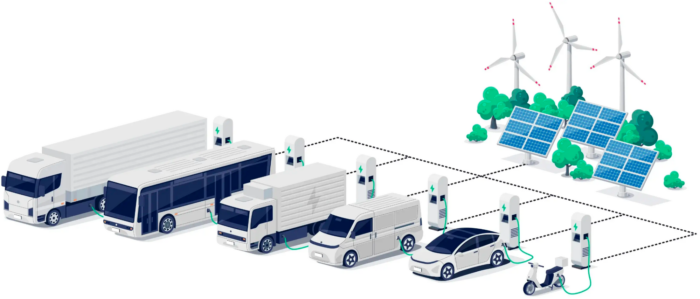
The Israeli renewable energy startup provides a platform that covers smart grids with comprehensive protection, covering its core vulnerabilities, from the security deficits of the devices in the network to proprietary protocols. Whether it is the electric vehicle charging station or a solar installation node, their solution protects it from internal and external threats. The project came to life in 2022, so it’s still in the pre-funding phase, but considering the tempo at which EV and solar infrastructure are expanding, it likely has a bright future!
#6 CarbonClean
Founded: 2009
Total funding amount: $14 M
Industry: renewable energy
Applications: fuel production from captured carbon
Mission: Empowering enterprises to reuse the emitted carbon for energy
While a big part of the initiatives described above focus on reducing emissions, this one tries to capture them back and use the recuperated carbon for fuel production. Carbon capture technology has been with us for over a hundred years already, but today’s startups make it much easier for companies to use its potential.
Carbon Clean provides a system for carbon capture that various sectors, from energy to refineries, can apply for their own purposes, adjusting its modular structure to their needs, whether for reuse or sequestration of CO2. In light of the recent regulations that enforce rigid emissions reduction on companies across Europe, the rise in popularity of such tools seems inevitable.

The uniqueness of Carbon Clean lies in its custom approach that allows to maximise the savings from carbon capture. Backed by BloombergNEF and Chevron, the startup already works with such market leaders as Arcanum Energy, and their business network will likely expand in the following years, particularly in the EU.
#7 Eavor
Founded: 2017
Total funding amount: $233.1M
Industry: geothermal energy
Applications: fuel production from captured carbon
Mission: Making geothermal energy production more accessible and scalable
While solar and wind solutions have been booming in recent years, the geothermal sector is much quieter, but it doesn’t mean there are no innovative initiatives appearing within it! Quite contrarily, companies like Eavor are working intensely to make geothermal energy more accessible on a global scale.
The USA renewable energy startup has decided to create an original system that solves the common challenges which stop geothermal solutions from growing. Its Eavor-Loop™ consists of two vertical wells that, together with numerous horizontal multilateral wellbores, create a sealed radiator-like system. Such a solution is much more ecological than most existing systems for geothermal energy. Contrary to them, neither does it produce any brine or solids, nor require water use or cause aquifer contamination.
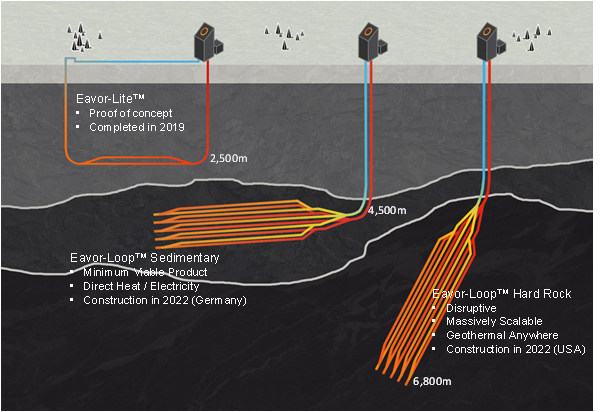
Moreover, it mitigates another risk linked to geothermal energy – seismic activity. Although the drilling itself doesn’t pose earthquake risk, the steam removal and water return can potentially raise it. Eavor’s solution eliminates that probability. At the same time, it does not emit greenhouse gases, meaning that enterprises can employ it for cheaper energy while meeting their climate goals and fitting into the regulations.
#8 Glint Solar
Founded: 2020
Total funding amount: 3.1M
Industry: solar energy
Applications: solar farm prospecting
Mission: Helping companies and investors find optimal places for creating solar farms
There are many misconceptions about solar energy production, one of them being their suitability for any environment. While some would assume the more sun, the better, solar panels are actually the most efficient in moderate sunlight and heat. Solar plant in the middle of the desert is, thus, not the best idea, neither by the rainy coast, since the humidity decreases the panel efficiency. And with the landscape protection laws, the pool of land suitable for solar investments is shrinking. Where’s the perfect place, then?
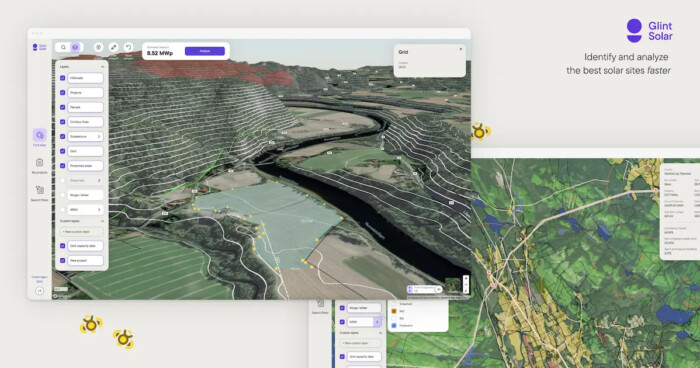
That’s what Glint Solar helps enterprises discover, offering prospecting services for solar plant-optimized land. The startup works in a SaaS model, providing companies with software that allows them to identify the areas potentially suitable for solar investments. They can use different filters to meet their criteria, from the land type to topography. The software helps them easily exclude protected land and find the landowners directly. Instead of prospecting directly, in a trial and error approach, they can save time and avoid issues in the future.
The already broad portfolio of this relatively young startup (founded in 2020) proves its solution is needed and necessary. To date, Glint Solar has partnered with such giants as Scatec, Fortrum, Blueleaf, Alight, and The World Bank, and we’re sure many partnerships are still ahead!
#9 SkySpecs
Founded: 2012
Total funding amount: $112 M
Industry: wind energy
Applications: wind energy infrastructure monitoring
Mission: Improving the efficiency and safety of the wind energy production infrastructure
Another wind energy startup in our ranking focuses on monitoring the wind power plant infrastructure, primarily the tall wind turbines. As we have already mentioned, their useful life is up to 20 years on average. However, with appropriate preventive maintenance solutions, such as the one provided by SkySpecs, we can extend it significantly, reducing waste and general expenses. Aside from maintenance, such software is also helpful in preventing incidents that could affect the continuity of energy production and even lead to power outages.
SkySpecs employs artificial intelligence to automate the monitoring and leverage the functioning of the wind power plant. Through their numerous sensors, the UAVs collect data that is continuously processed by the AI model, providing guidelines helping in obstacle avoidance, stabilisation, and 3D localization.
#10 Tespack
Founded: 2015
Total funding amount: $1.1 M
Industry: renewable energy
Applications: smart mobile energy
Mission: Delivering efficient renewable sources of energy to the most challenging environments
To end our ranking – another startup that does not fear challenges, aiming at bringing sustainable energy solutions to the demanding markets. Tespack has already powered space expeditions and its solutions have been present in the most remote areas of the world, particularly on the African continent. Founded in Finland in 2015, the startup provides companies and organisations, including Save the Children and the Austrian Space Forum, with its proprietary hardware paired with an AI-based deep learning system that enables increasing battery lifetime and recycling accuracy.
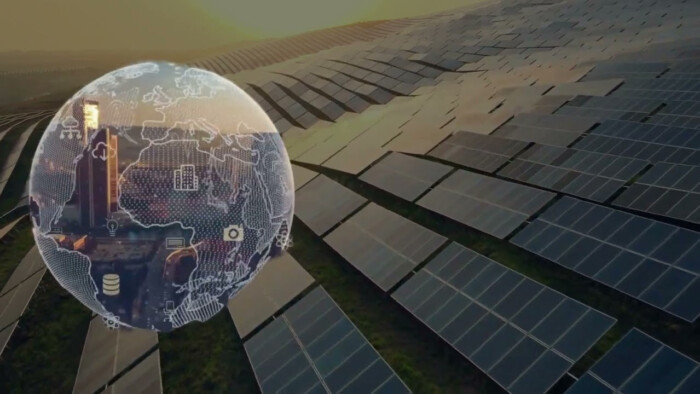
So far, Tespack devices have improved the quality of education in various schools of rural Congo and Colombia, equipping them with easy-to-use, efficient solutions that enable them to reach out for digital resources. Claimed to consist of one of the most efficient cells on the market, their panels were tested in extreme conditions like the Sahara desert or Mars, making it a perfect choice for astronauts or extreme adventurers. We cannot wait to see the further development of this project, making a significant positive impact on science and the life of remote communities.
What is the future of renewable energy startups?
The renewable energies startup scene is blooming and will likely continue to do so, given the direction governments are taking in terms of climate law. What will the future bring? Hopefully, the efforts the green energy startups have made so far will contribute to the fight against global warming and the total replacement of non-renewable sources. Although it’s hard to predict the trajectory of these changes, we have some ideas on how the renewable sector may evolve.
Best renewable energy startups – how are they shaping the industry
The solar sector is definitely taking the lead in renewable innovations, providing both entrepreneurial and individual users with tools that make solar energy production much more accessible. Now that the Kirchoff law for thermal radiation was disproven, we may experience a second wave of photovoltaic inventions using much more efficient methods to increase the absorptivity of solar panels.
Based on the list above, we can see that the solar sector is aiming towards removing the main obstacles on the path towards broader adoption, like the limiting infrastructure, waste production, and the demand for minerals like lithium and silicon. Once the fragility and efficiency issues with the perovskites are solved, we may experience a revolution on the solar market as the production shifts towards this much more flexible and environmentally friendly group of minerals.
The future in renewables is mobile and zero-waste. Looking at the best renewable energy startups in our ranking, you can see they put a strong emphasis on the waste reduction and efficiency optimization, replacing the commonly used devices and raw materials with more sustainable inventions. Not a long ago, scientists ate the first gummybear made entirely out of the wind turbine (which consisted of thermoplastic resin instead of the commonly used glass fibre). What’s next? Time will tell!
At Miquido, we closely follow the startup-related news so that you can stay updated! Sign up to our newsletter or write to us directly if you have an renewable project in mind yourself! We provide industry-specific it services and have all the tools at our disposal to bring an innovative product or service to life.






